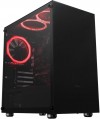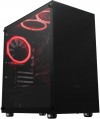The operating system that the PC comes with. Its presence is not mandatory — many configurations are sold
without a pre-installed OS, in the hope that the user can choose the system at his discretion. However, in many cases it is easier to buy a PC with an operating system on board: this allows you to at least use it right out of the box (with a few exceptions, see below).
Most often nowadays, computers use
Windows 10,
Windows 11,
Linux or macOS. More details about them and other OS:
— Windows 10. Among the main innovations of the "dozens" are the built-in voice assistant Cortana, the Edge browser, support for multiple desktops, updated Start menu and notification centre, a major update of standard pre-installed programs, etc. It is available in several editions, in this case, the basic version is meant —
Windows 10 Home, designed for home use and small organizations.
—
Windows 10 Pro. The professional edition of Windows 10 described above, designed for the business sector, as well as professionals and IT enthusiasts. In addition to the functionality of Windows 10 Home, it offers a number of advanced features — such as Active Directory, remote desktop, BitLocker encryption tool and a tool for working with Hyper V virtual machines. Note that a
...n even more advanced edition of Pro For Workstations is being released for powerful workstations, however it is practically not used as a preinstalled system — it is assumed that it is more convenient for the user to choose whether he needs such an edition or not.
— Windows 11. The first major system update from Microsoft in the last six years since the release of "ten". The OS has redrawn most of the icons of standard programs and window controls, the lion's share of actions is accompanied by new animation. The main thing in the redesign is the Start menu button that has moved to a place in the centre of the lower part of the screen. Together with the operating system, Android applications debuted in the Microsoft Store. In general, the system can be considered as a big update of Windows 10 with a serious redesign of the interface, rather than a radically new OS.
As before, Windows 11 is divided into two large camps: Home and Pro. More narrowly focused versions of this operating system (Education, Enterprise, Mixed Reality, etc.) are also being released.
— Windows 11 Home. The basic version of the system for use on a home computer or laptop. Supports only one processor, which can have less than 64 cores, recognizes up to 128 GB of RAM. For the initial setup of the system, it is necessary to have an active Internet connection.
— Windows 11 Pro. The Pro version of Windows 11 contains a number of advanced features compared to the home edition of the OS. In particular, it has Hyper-V hardware virtualization tools, an isolated environment for the safe execution of Sandbox computer programs, advanced cyber protection functions (BitLocker, WIP), an Active Directory service for connecting to a single network with other devices (printers, servers, other computers). The system can be set up with a local account directly for your PC.
Separately, it is worth noting that earlier versions of Windows — Windows 8 (8.1) and Windows 7 — are considered completely obsolete, are extremely rare, and even in such cases they usually offer the possibility of a free upgrade to the latest editions of the OS from Microsoft.
— Linux. An operating system developed and maintained by a community of programmers around the world. Unlike Windows, it is free, but in many ways it is not inferior to it: it has its own graphical interface and a fairly extensive set of software for solving various tasks (including work ones). If you're not used to it, Linux can be somewhat difficult to learn for an inexperienced user, especially one who has dealt mainly with Windows; however, quite "friendly" and simple versions are usually used as pre-installed ones. At the same time, open source gives experienced enthusiasts ample opportunity to customize the system and write their own software. The unequivocal disadvantage of Linux is that fewer games and specialized professional “software” are available for this OS than for Windows.
— macOS. Apple's proprietary operating system, used only on Mac computers. It is considered more reliable and stable than Windows, but the reason for this is rather specific: macOS is used on a relatively limited number of devices, and it is much easier to optimize it for a specific hardware. It is also worth noting that system updates are released regularly and are available free of charge for all Macs that meet the system requirements. MacOS is well suited for "general professional" applications, including tasks like layout, design, and video editing. In addition, in recent years, the system has been increasingly integrated with the iOS mobile operating system, in particular, making it easy to transfer work tasks from a PC to a smartphone / tablet and vice versa. However, there are relatively few highly specialized software and games for macOS.
— DOS. An operating system with basic functionality, without a graphical interface and controlled via the command line. In fact, it is used only for a general check of the PC's performance and for launching installers with a full-fledged OS; it actually makes no sense to use DOS for other tasks.
More specific options for pre-installed operating systems in modern PCs include, in particular:
— Android. A system originally designed for mobile devices and optimized primarily for touch screen operation. Thus, it is rarely used in a PC, and in a rather unusual variety of devices — monoblocks (see "Type"), which are reminiscent of enlarged tablets in design (up to the possibility of holding such a device on your lap while working). However, the main reason for the low popularity is not even these technical features, but the fact that in general Android is designed more for entertainment use and is rather poorly suited for business, educational and other similar tasks.
— Windows Embedded Standard 7E 32. A specialized edition of Windows 7 (see below), used, in particular, in thin clients (see "Type"); not designed for traditional PCs.
— HP Smart Zero Technology. Another OS for thin clients — in this case, developed by HP and installed mainly in computers of this brand.
